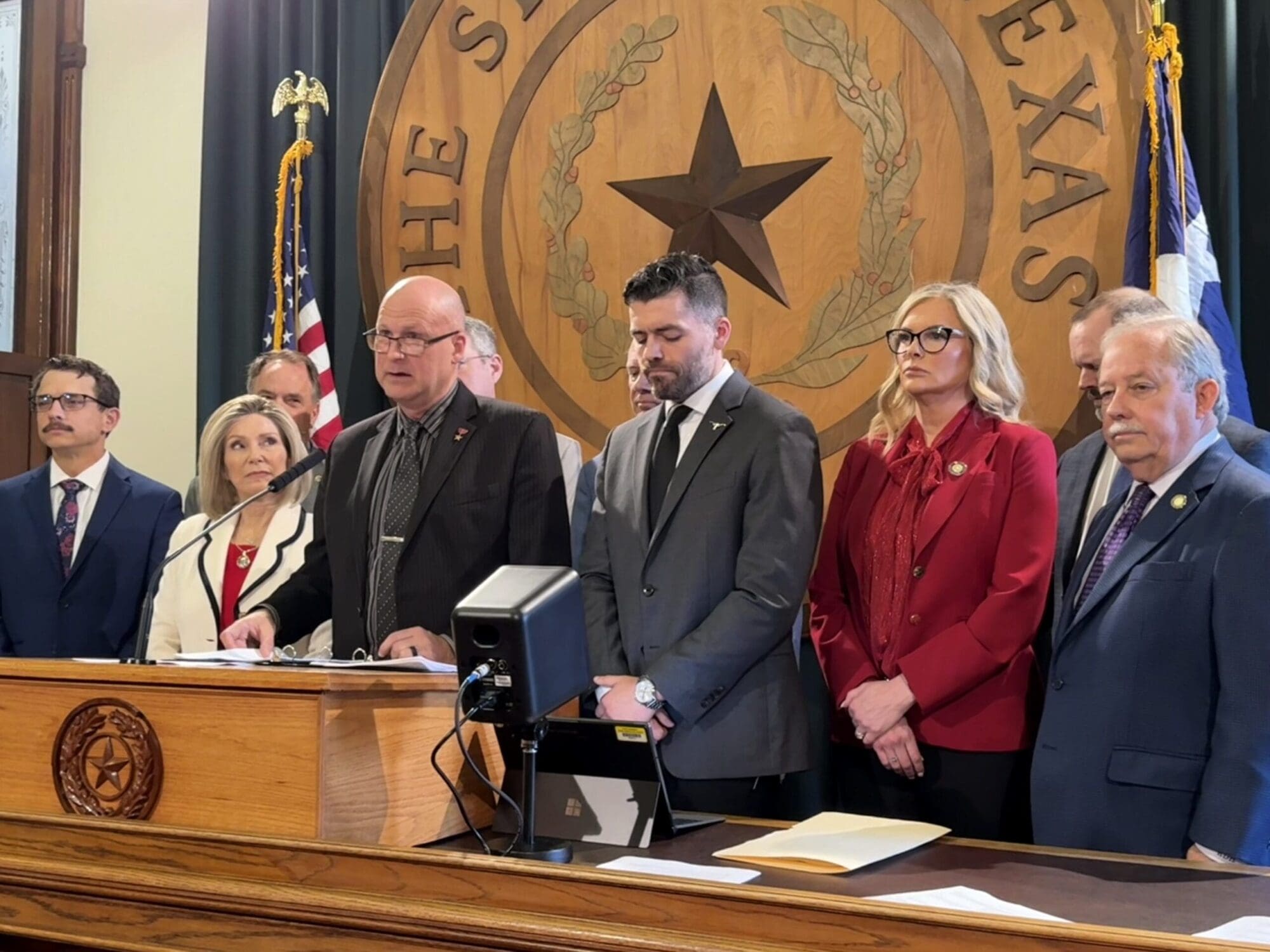At the Republican Party of Texas’ biennial convention in San Antonio next week, delegates will have the opportunity to choose the next state party leader for the next two years.
With current Chairman Matt Rinaldi not seeking re-election, the field has grown to six candidates. Texas Scorecard asked each candidate a series of questions, including what they see as the proper role of the chair and what should be done with elected Republicans who ignore the party’s priorities. Here are their responses:
__________________________________
What is the biggest reason you have decided to run for chair of the Republican Party of Texas?
Abraham George: Our party faces a critical decision. Do we want a ceremonial party focused on awards and events, or one that empowers the grassroots with data and resources to win elections and advocate for strong legislative priorities? I want to build the party to be more powerful than the Austin Swamp, PACs, and elected officials who think we don’t matter. Our goal is to turn our priorities and platform into law.
Ben Armenta: I’m running to partner with every County Chair, EC, and SREC Member to build the apparatus required to beat the Democrats for the next 30+ years of Texas politics. Marxists are relentlessly scheming and activating, and the Republican Party must rise up to put them down for good. That type of focused-leadership is missing and is why I decided to run.
Dana Myers: Five short months after our RPT convention, we must stop the Biden/WEF/globalist agenda from doing further harm to Texas and the Nation. I am running for Chair to be certain Texas is prepared with the very best election integrity program, with fully trained election workers and poll watchers, war rooms, and legal teams to address election issues in real time, equipping our precinct and county chairs and our grassroots to mobilize our voters to achieve Republican victories on the entire ballot. I have already done these jobs over the past several years in my numerous leadership positions, and I am ready on day 1 to build the grassroots army we will need to protect Texas and our 40 electoral votes.
Weston Martinez: I am running for Republican Party of Texas Chair to empower grassroots conservatives and unleash them as the most potent political force in Texas, to fight to secure our ballots and restore election integrity so the people of Texas can have faith in the fact that our elections are secure, accurate, and trustworthy, and to ensure our conservative legislative priorities are enacted and our lawmakers understand that Republicans are in the majority in Texas and it’s high-time we start acting and governing accordingly.
Mike Garcia: As a longtime conservative activist, meeting my wife through the pro-life movement, I have worked along with grassroots conservatives long before I announced my candidacy. I have met many conservatives who work day and night to support the Republican Party. When Chairman Rinaldi announced he was not running, I felt the call to stand up and help support those who are working across Texas to keep our state conservative.
Matt Mackowiak: RPT is undeniably unprepared for the most important election in our lifetime, and it’s time for a serious team to take it over to ensure that Trump’s win margin is the largest it can be, and Sen. Ted Cruz wins re-election, so we don’t lose the country.
__________________________________
What do you see as the main role of the Texas GOP Chair?
Abraham George: The Party Chair should advance the conservative agenda by building robust party infrastructure and fundraising effectively. They must focus on electing conservatives to office and holding them accountable. This approach ensures our principles are turned into actionable policies.
Ben Armenta: The Chairman role is an executive operations role, geared towards retaining seats/positions for the GOP and winning more blue and open offices over to our Party. All great ideas, whether it is securing elections, registering voters, building a ground game, championing legislative priorities, etc., require extensive financial resources. Under my leadership we will build and prioritize state-wide fundraising efforts, in-service of both state and county/local needs.
Dana Myers: The role of the Chair is described in the Texas election code, RPT bylaws, and SREC bylaws. The Texas GOP Chair should also be fully focused on energizing and mobilizing every level of Republican in Texas to promote conservative values and elect Republicans to every office. To accomplish these tasks the GOP Chair must not only espouse Republican principles and interface with our elected officials to achieve our priorities, but also raise the funds to support a full headquarters and field staff.
Weston Martinez: To give voice to the conservative grassroots, to ensure that our Republican legislative priorities are taken seriously by lawmakers and become law, to combat voter fraud and lead the fight for election integrity, to elect Republican candidates up and down the ballot and develop a farm team of strong conservatives who are ready to seek office when opportunities present themselves, to fight back against George Soros and his efforts to turn Texas blue, and to raise the funds needed to ensure that the RPT continues to be the dominant political force in Texas, to grow our party, to support those Republican nominees who support our platform and will govern accordingly, to conduct our elections, and to pay for our state convention.
Mike Garcia: I believe the Texas GOP Chair has 4 main priorities: Recruiting Conservative Candidates Who Will Champion Our Priorities, Funding a Party Infrastructure that will elect Conservative Republicans up and down the ballot in November, and Ensuring that Republican Priorities are Signed into Law. The Chair should also ensure that Republican voters are informed of what their elected officials are doing after being elected, and that voters have the tools necessary to hold those elected officials accountable should they fail to support our Republican priorities, along with ensuring that the State Republican Executive Committee is in a strong position to do their job.
Matt Mackowiak: 5 things equally: 1. Advance the platform and legislative priorities at the Legislature. 2. Win general elections. 3. Recruit candidates. 4. Raise money. 5. Grow the party (voter registration, support for county parties, clubs and auxiliaries, outeach).
__________________________________
Should the party move to close its primaries, with or without the Texas Legislature?
Abraham George: We must close our primaries to ensure only Republicans elect our nominees. Allowing Democrats to participate is allowing them to choose weaker candidates who align more with their views, undermining our conservative choice. Under my leadership, we will close the primaries either legislatively or through our rules, as open primaries pose an existential threat to our party.
Ben Armenta: The Party should move towards closing our primaries, and pursing it legislatively will add significant teeth, allowing for: (1) robust constituent dialogue, (2) public record voting by legislators, (3) ability to put into election code, standards which must be adhered to by the Democrats as well, (4) options to consider county-by-county flexibility, and most importantly, (5) as litigation arises, the ability for the Attorney General’s Office to help defend those election code changes.
Dana Myers: I have supported closing our primaries for years, and we must explore all routes to closing our primaries, and that includes planning for the legal and fiscal requirements both the legislative and party-driven paths require. The process must be carefully drafted and boldly implemented, protecting the integrity of our elections and supporting our activists and candidates up and down the ballot. We must integrate this with methods to allow transparency and ease of auditing elections, such as precinct-based voting, paper ballots and other election integrity measures.
Weston Martinez: I have been calling for closing the Republican Primary since Mitt Romney was running for President. If we are to maintain and protect the conservative character and integrity of our party, we must close our primary, and as RPT Chair I will lead the fight to do so. While I hope our Republican majority in the Texas Legislature will take action to close our primaries, I do not see that as being required. The Republican Party of Texas is a private organization and can enact whatever rules are necessary to protect its interests including closing our primary to minimize Democrat and Republican in Name Only influence.
Mike Garcia: All options to close our primaries should be on the table. Since other state GOP parties have done it successfully, the first step should be the SREC looking into closing Republican primaries by party rule. I anticipate that the rule will likely face legal challenges from the opposing side—that’s why we need to draft it making sure it’s 100% bulletproof from a lawsuit. With my legal and legislative expertise, I have the experience needed to make sure we do it right!
Matt Mackowiak: Constitutionally, it cannot be done without the Texas Legislature. The idea has some merit, and the 2024 convention will clearly pass it as part of the platform. The idea must be studied as to cost, administration, and implementation and I believe the Legislature will take the idea seriously in 2025, as it should.
__________________________________
What should the party’s stance be towards elected Republicans who fail to pass the party’s priorities?
Abraham George: If you wear our uniform and use our name, you can’t play for the other team. We must support our legislators in advancing the conservative agenda. I want to champion every conservative bill passed, but I can’t do that if our members are playing for the opposition, hence my support for Rule 44.
Ben Armenta: I believe most folks I’ve met are curious about “what the party’s stance should be towards elected Republicans who purposefully block, hinder, or limit the ability to advance the party’s priorities?” In those circumstances, the RPT must broadly and boldly highlight that those individuals worked against the priorities (i.e., worked against the Grassroots) and clearly outline the official’s actions taken (or not taken) to do so. The RPT has a responsibility to inform the electorate so they cast their votes with eyes wide open, and additionally, the SREC will continue to evaluate what additional consequences may be necessary based on the impact of the actions (e.g., Rule 44)
Dana Myers: I strive to address folks using the techniques outlined in Matthew 18:15, privately advising and counseling BEFORE irrevocable harm is done but ultimately being prepared to go public if required. Discussing concerns early gives everyone the opportunity to explain their decisions and concerns, making course corrections. If private counsel fails, obviously we must have a robust program of public notification and possible censure.
Weston Martinez: I have a proven track record of holding our Republican legislators accountable since 2012 when I was the lone Republican official in Bexar County to actively call out and work to defeat then Speaker of the Texas House Joe Straus who was my own State Representative at the time. As RPT Chair, not only will I publicly expose those Republican in Name Only legislators who do not support or who work against our party platform, but I will also call and work for their defeat when up next for election. I am the only candidate for RPT Chair who has a plan to help empower the grassroots to hold their Republican legislators accountable for their actions and votes.
Mike Garcia: Republicans that turn their back on our priorities are not upholding the values of the Republican Party. If an elected official isn’t willing to support the legislative priorities passed by our delegates, that needs to be made clear to voters. Republican voters should also be educated on their power to censure their elected Republican officials who fail to uphold the values of the party so that they can decide whether anyone among them should challenge the censured elected official in a primary.
Matt Mackowiak: Criticism of elected Republicans should be done in private by RPT, but opposition to our platform opens all Republicans up to policy-based criticism. Primaries are healthy and competition makes everyone better. Per its bylaws, RPT must remain neutral in partisan primaries and we must respect our bylaws or change them.
__________________________________
How will you work to help secure elections?
Abraham George: Clearly marked, sequentially numbered, fully auditable ballots are a must. If machine ballots can’t be audited, we must return to hand counting. To ensure election integrity, we need to restrict mail-in ballot abuse, reduce early voting to two days, and eliminate “executive exceptions” from the Secretary of State.
Ben Armenta: In the near-term the RPT must hire, ready, and stage regional legal teams across the state who are prepared to investigate, file injunctions, and litigate any fraudulent findings in November 2024. Long-term, I plan to advocate for legislation to change the Secretary of State from an appointed position to an elected position. We also must use legislation to allow for a centralized team of poll workers and watchers to serve in any of the 254 counties – a team which the RPT would train and deploy to fill gaps for any and all election cycles.
Dana Myers: Securing our elections has been one of my top priorities as Vice Chair: get us out of the “ERIC” system (doing more left-leaning voter registration and bloating our voter rolls than voter roll cleaning), working to ban ranked choice voting, and making sure that only US citizens vote by exposing the election law loopholes that are prevalent in Texas and nationally(magnified by our open border crisis), voter roll cleaning, data review, stopping Soros-funded dark money NGOs from pouring money into the counties and college campuses doing massive voter registration drives aimed at left-leaning groups, stopping the left’s NGO’s from voter registration of illegals crossing the border, fixing legislative loopholes in the election process, advocating for watermarked, sequentially numbered paper ballots and precinct-based voting. I have been working with the election integrity groups across Texas, National Republican groups, and National Foundation leadership to make sure Texas is up to date on the latest information, Election Integrity legislation and action, discussing what we are seeing on the ground in Texas and across the country to work to prevent or remove this problem in Texas before it grows.
Weston Martinez: I will lead the charge to secure our Texas elections, by fighting to: 1. Return prosecutorial authority for election fraud to the Attorney General of Texas 2. Require proof of citizenship and a Texas state-issued ID to register to vote in Texas, and prohibit the use of a utility bill to register. 3. Return to hand-counted, sequentially numbered paper ballots, and employ blockchain technology to detect tampering 4. Eliminate voting centers and return to precinct-level voting only 5. Eliminate the break between early voting and election day in order to minimize fraud, abuse, and chain of custody issues 6. Eliminate the 29 ballot-related waivers issued by the Texas Secretary of State to increase ballot security and integrity. 7. Call for the direct election of the Texas Secretary of State so that Texas’ chief election officer is directly responsible to the people, and; 8. Close Primaries in order to minimize the ability of Democrats to influence Republican Primaries by voting for RINOs.
Mike Garcia: I would immediately start working with the Secretary of State’s office to ensure that the laws we currently have on the books are being enforced with respect to election integrity. I would also immediately begin a training program for Republican poll watchers and election judges to ensure we have the maximum number of eyes possible overseeing how the November election is conducted. After November, I will work to ensure that legislative priorities, one of which will certainly be election integrity, become law by working with grassroots activists to contact their representatives and senators to get their support
Matt Mackowiak: I have pledged to launch a gold standard Election Integrity effort with at least a $1M budget, with two co-chairs identified and in place, to recruit 1,000 lawyers to ensure laws are followed, all within 60 days. I also believe the Governor should call a special session to pass the SAFE Act (denying a right to vote for noncitizens), which passed the Senate in 223 but did not pass the House. We will secure the 2024 election.





